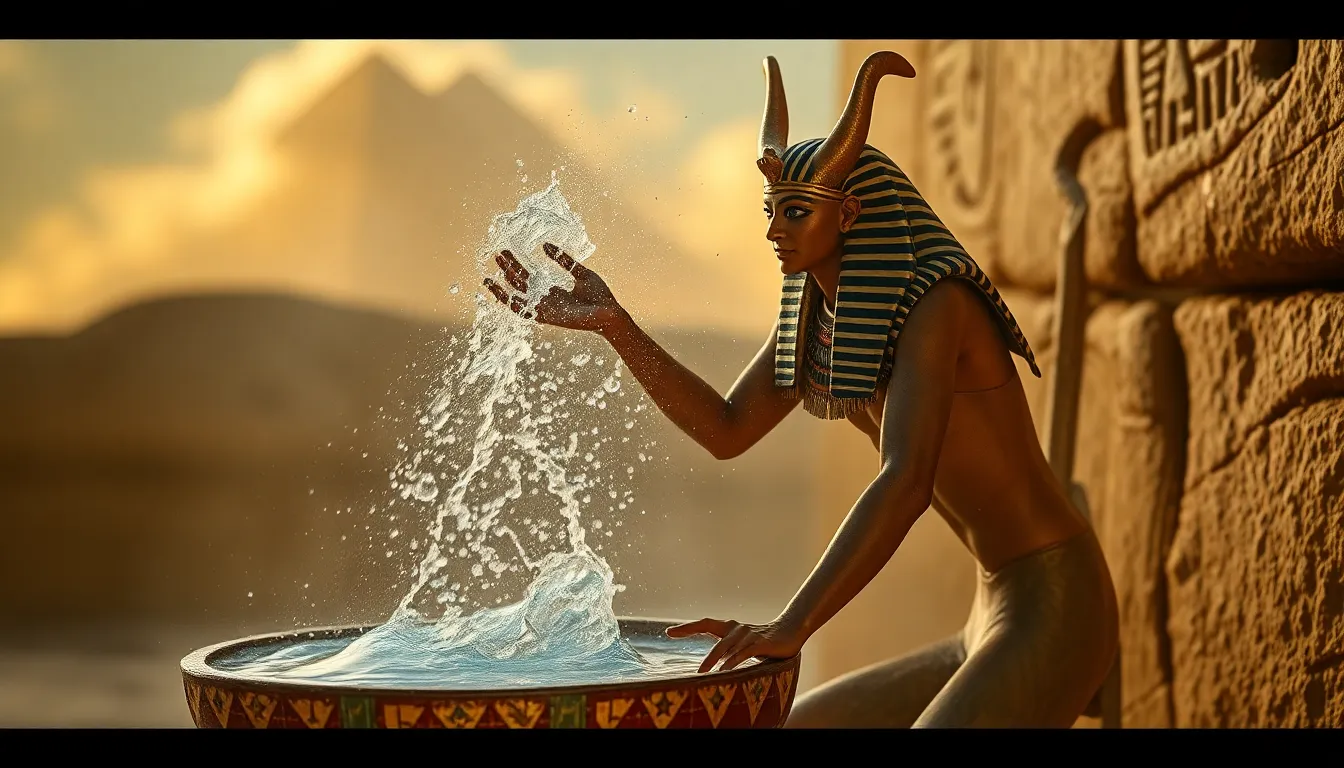The Importance of Ritual Cleansing in Egyptian Practices
I. Introduction
Ritual cleansing in ancient Egypt was a vital practice that involved various methods aimed at achieving purity, both physically and spiritually. This practice was deeply intertwined with the religious beliefs and daily activities of the ancient Egyptians. Cleansing rituals were seen as essential for maintaining the favor of the gods and for ensuring a harmonious life on earth.
The significance of ritual cleansing extended beyond mere hygiene; it was a fundamental part of their cultural identity, reflecting the Egyptians’ understanding of the cosmos and their place within it. This article aims to explore the multifaceted role of ritual cleansing in ancient Egyptian society, including its historical context, theological significance, various types of cleansing practices, and its impact on daily life.
II. Historical Context of Ritual Cleansing
The origins of cleansing practices in ancient Egyptian society can be traced back to the earliest dynasties. These rituals were influenced by the natural environment, particularly the Nile River, which was viewed as a source of life and purity. The annual flooding of the Nile not only replenished the land but also served as a metaphor for spiritual renewal.
Throughout different dynasties, the methods and significance of cleansing evolved. For instance, during the Old Kingdom, elaborate rituals involving the washing of statues of deities were common, while the New Kingdom saw the introduction of more personal cleansing practices among the populace. These changes reflected shifting social and spiritual hierarchies, where the roles of priests and ordinary citizens began to overlap in the context of purification.
III. Theological Significance of Cleansing
In ancient Egyptian belief, the act of cleansing was intrinsically linked to the gods and the concept of divine purity. The Egyptians believed that the gods required offerings of cleanliness and purity to maintain cosmic order (Maat). Cleansing rituals were often performed before significant religious ceremonies, ensuring that participants were in a state of purity to commune with the divine.
- Connection to the Gods: The gods were thought to embody purity, and thus, rituals aimed at cleansing were essential for aligning oneself with divine will.
- Myths and Legends: Numerous myths highlight the importance of cleansing, such as the story of Osiris, where purification played a crucial role in his resurrection.
- Preparation for Ceremonies: Priests underwent extensive cleansing rituals before conducting temple rites, emphasizing the need for purity in spiritual practices.
IV. Types of Ritual Cleansing
Ritual cleansing in ancient Egypt was categorized into various methods and forms:
A. Physical Cleansing Methods
Physical cleansing often employed:
- Water: Freshwater from the Nile was commonly used for cleansing, symbolizing life and renewal.
- Oils: Various oils were applied to the body for both cleansing and anointing, believed to ward off evil spirits.
- Incense: Burning incense was a common practice to purify the air and sanctify spaces.
B. Symbolic Cleansing Rituals
These rituals involved:
- Sacred Words: Reciting specific prayers or spells was believed to impart spiritual purity.
- Gestures: Certain hand movements and gestures were employed to signify cleansing and protection.
C. Cleansing in Funerary Practices
In funerary contexts, cleansing played a pivotal role, with the body of the deceased being ritually washed and anointed as part of the preparation for the afterlife.
V. Cleansing in Daily Life
Ritual cleansing was not confined to religious practices; it permeated daily life among the general population. Cleanliness was considered a virtue, and various practices were adopted to maintain hygiene:
A. Practices Among the General Population
Many Egyptians engaged in regular bathing and used perfumes and oils to enhance personal cleanliness.
B. Importance of Cleanliness in Homes and Personal Grooming
Homes were kept clean, reflecting the belief that a tidy environment attracted divine favor. Personal grooming was seen as essential, with many dedicating time each day to bathing and applying scents.
C. Rituals as a Means of Maintaining Societal Order
The emphasis on cleanliness and ritual purification helped to reinforce social norms and hierarchies, promoting a sense of community and order within society.
VI. Cleansing Objects and Symbols
Various sacred objects were integral to cleansing rituals:
A. Sacred Objects Used in Cleansing Rituals
- Water Vessels: Often elaborately decorated, these vessels were used to hold water for purification.
- Incense Burners: Used to burn herbs and resins during cleansing ceremonies, creating a purifying smoke.
B. Symbolic Meanings of Water and Other Cleansing Agents
Water symbolized life and rebirth, while oils and incense were seen as protective and purifying agents.
C. Iconography Related to Cleansing in Art and Artifacts
Artistic representations often depicted scenes of cleansing, emphasizing its importance in both life and the afterlife.
VII. Comparisons with Other Ancient Cultures
Ritual cleansing practices can be observed in various ancient cultures, providing a comparative perspective:
A. Similarities and Differences with Mesopotamian Practices
Both cultures emphasized purification, but Mesopotamian rituals were often more elaborate and communal.
B. Ritual Cleansing in Other Ancient Civilizations
In Greece and Rome, cleansing rituals were also prevalent, often linked to civic duties and personal health.
C. Influence and Exchange of Cleansing Practices Across Cultures
The exchange of ideas regarding purification rituals occurred due to trade and conquest, leading to a rich tapestry of practices across civilizations.
VIII. Conclusion
In summary, ritual cleansing in ancient Egypt was of paramount importance, reflecting deep religious beliefs and societal values. From its historical roots to its theological significance, cleansing practices shaped the spiritual and communal life of the Egyptians. The legacy of these rituals continues to resonate today, reminding us of the enduring need for purity and order in both our personal and communal lives.
As we reflect on the role of ritual cleansing in ancient Egypt, we gain insights into how these practices not only influenced the past but also hold relevance in modern spiritual and cultural contexts.




